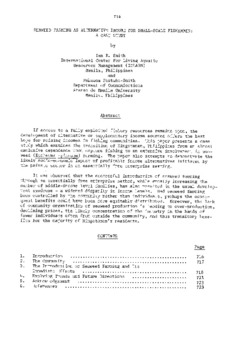Seaweed farming as alternative income for small-scale fishermen: a case study

Citation
Smith, I.R.; Pestaño-smith, R. (1980). Seaweed farming as alternative income for small-scale fishermen: a case study. Proceedings of the Indo-Pacific Fishery Commission 19(III):715-729
If access to a fully exploited fishery resources remains open, the development of alternative or supplementary income sources offers the best hope for raising incomes in fishing communities. This paper presents a case study which examines the transition of Hingotanan, Philippines from an almost exclusive dependence upon capture fishing to an extensive involvement in seaweed (Eucheuma spinosum) farming. The paper also attempts to demonstrate the likely socio-economic impact of profitable income alternatives initiated by the private sector in an essentially free enterprise setting. It was observed that the successful introduction of seaweed farming through an essentially free enterprise method, while greatly increasing the number of middle-income level families, has also resulted in the usual development syndrome - a widened disparity in income levels. Had seaweed farming been controlled by the community rather than individuals, perhaps the consequent benefits could have been more equitably distributed. Moreover, the lack of community organization of seaweed production is leading to over-production, declining prices, the likely concentration of the industry in the hands of .ewer individuals often from outside the community, and thus transitory bene fits for the majority of Hingotanan's residents.
Permalink
Date Available
Type
Publisher
Research Themes
Topics
Language